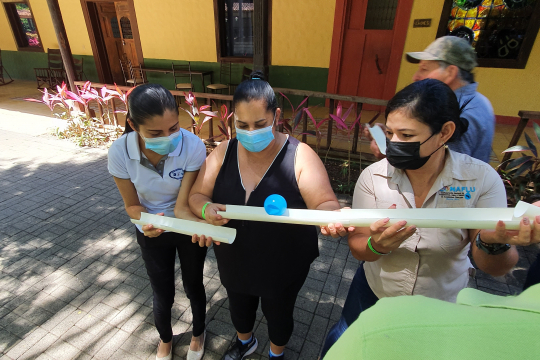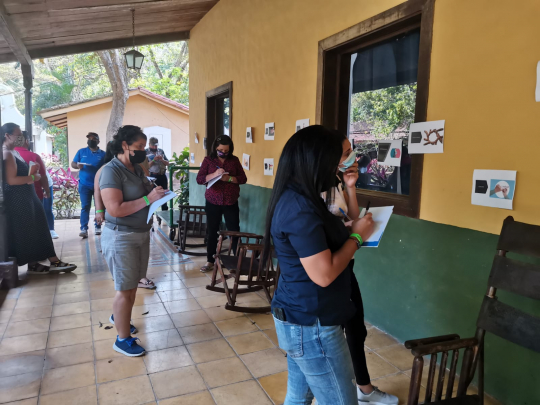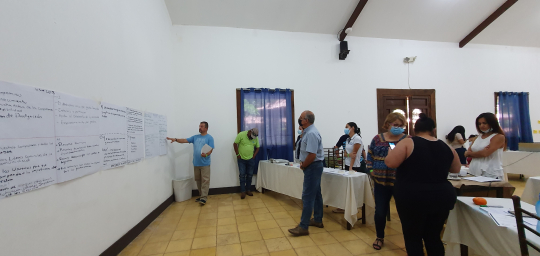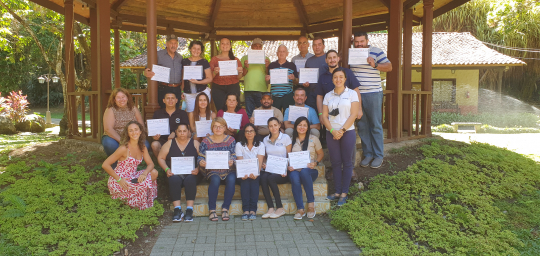Nine women and nine men from rural communities of Costa Rica representing water community organizations (WCO) received training in communication and leadership and the modern management of social enterprises. The WCO provides water services to many people in rural and peri-urban areas. The training was a three-day workshop held in Camaronal, Puntarenas, a coastal community of Costa Rica, at the end of February.
The main objective of the workshop was to promote a space of exchange and the learning of new tools to strengthen the management of water community organizations. Another way to improve their opportunities is to influence the federations, leagues, and unions (FLU) of WCO.
Bárbara Viguera, EfD Central America research fellow said: "The workshop was useful to reinforce the abilities and the efforts of the people involved in the FLUs, and to establish a base for transfer of the knowledge and abilities to other members."
Participatory workshop
The eighteen participants of the workshop were involved in very dynamic activities planned by the EfD team in charge of the event.
Anthony Gamboa, EfD Central America junior researcher was one of the instructors. He took advantage of the outdoor setting where the workshop was held, to implement some of the learning activities.
One of the activities focused on teamwork, communication, and leadership. The participants played a game using empty water pipes to move a ball from one place to the other following the instructions of a person chosen as leader.
Another activity was called the Museum of the Qualities and Personal Weaknesses. Images with values and anti-values were placed on a wall and dialogue and analysis about them were developed with all the participants.
Karen Guzmán, a representative from the Water Community Organizations Union of Osa (UNCAOSA), and a worker at the WCO of Sierpe said that the activities were very dynamic and that they could get feedback.
She said that they learned about client service and the use of different communication tools to provide more and better information to the people in the community.
Randall Varela, project manager from the United Communities in Water Conservation League (Liga Cuenca), agreed. "I think it was a very timely training for us, the methodology used was very participatory, very enjoyable," he said.
Learned how to involve the next generation
In the community of Sierpe, located on the Pacific coast of Costa Rica, an activity is organized by the local WCO every 22nd of March, in commemoration of the World Water Day. High school students between 15 and 17 years old from the Liceo Rural Boca Sierpe attended this event.
Usually, the students are invited to plant trees, visit the catchment area, paint informative signs, and walk near the river to clean the zone. However, this year, and after the participation in the workshop, the representatives from the WCO of Sierpe learned that they should ask the students how they would like to help, instead of telling them how to collaborate.
"We learned something in this workshop," said Karen Guzman. "What we ask people to help us with is not necessarily what people could or would like to give or contribute," she added.
"Since we also learned about different communications tools, the role of social media platforms, the importance of creating videos, and taking pictures to improve the communication with the people, we were able to talk to the students about it. The response was very positive. Now, the students want to support the WCO to have a closer relationship with the community of Sierpe."
Transferring knowledge
The Liga Cuenca will start a training process in May 2022 aimed at 50% of the members, which represents nearly 30 people from the nine WCOs that formed part of the League.
This League has its offices in the community of San Antonio of Naranjo, in the province of Alajuela, from where Randall Varela coordinates the actions and prepares this year's training plan.
"The workshop helped us incorporate new topics for our training plan. We are planning to create a certificated course on water community management," he said, emphasizing that this is something completely new.
About the Workshop
The workshop titled Tools to improve the community water management and to promote the transference of knowledge and abilities in water community organizations was organized by EfD Central America, the Tropical Agricultural Research and Higher Education Center (CATIE), with the support of the National Confederation of Federations, Leagues, and Unions of Community Aqueducts (CONAFLU), from February 23 to the 25, 2022.
This is part of the Accountability, Use of Technology, and Citizen Participation for the Improvement of Water Services in Vulnerable Communities in Costa Rica (WAPP) project, funded by the Central American Regional Security Initiative (CARSI), from the United States Embassy in Costa Rica.
Written by: Marianela Argüello L.



